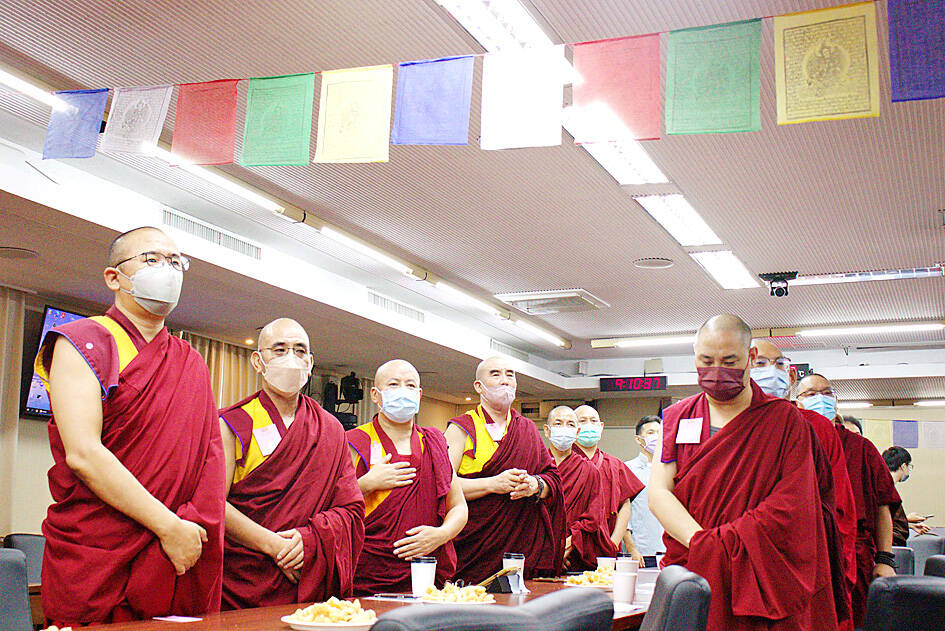Taiwan and Tibet share a democratic way of governance, and China’s oppression cannot make Tibetans abandon their belief in democracy, the Central Tibetan Administration’s Sikyong Penpa Tsering said in a pre-recorded message at an event yesterday marking the 62nd anniversary of the founding of Tibet’s government-in-exile.
Tsering’s pre-recorded comments were played at an event at the legislature in Taipei jointly held by the Taiwan Tibetan Welfare Association, the Dalai Lama’s Tibet Education Foundation and the Taiwan Parliament Group for Tibet to mark the founding of the Tibetan parliament in exile.
The 14th Dalai Lama and 80,000 Tibetans were exiled after China invaded the country in 1959, and on Sept. 2, 1960, the Dalai Lama established the organization now known as the Tibetan government-in-exile, becoming the first democratic body in Tibet.

Photo: CNA
Taiwan has experienced increased Chinese aggression around its territory this year, Tsering said.
However, he said he believes that Taiwan is prepared to counter China’s threat and prevent a Chinese invasion.
Independent Legislator Freddy Lim (林昶佐) said at the event that the Tibetan efforts over the past two decades had not been wasted, citing the first democratic election of the Central Tibetan Administration’s sikyong Lobsang Sangay in 2012.
The act symbolizes Tibet’s maturity as a nation and that the sikyong is no longer a symbolic role, Lim said.
Taiwan Parliament Group for Tibet Deputy Director-General Hung Shen-han (洪申翰) said he witnessed the accomplishments of the Central Tibetan Administration’s efforts over the past 10 years when in June he attended the 8th World Parliamentarians Convention on Tibet with Lim.
The attending members talked not only about Tibet, but also about how the international community should act against the oppression of authoritarian states, Hung said.
Tibetans have experiences to share with other countries suffering Chinese oppression, Hung added.
The former Soviet Union and the Chiang (蔣) family of the Chinese Nationalist Party (KMT) are examples of oppressive dictatorships, New Power Party Legislator Chiu Hsien-chih (邱顯智) said.
Democratic Progressive Party Legislator Michelle Lin (林楚茵) said that many support a democratic Tibetan government, adding that she hopes Tibetans continue their fight against the tyranny of the Chinese.
Wuer Kaixi, a prominent leader of China’s 1989 Tiananmen Square protests and living in exile in Taiwan, said his people, the Uighurs, have paid a great price for their resistance, but their sacrifice has allowed the world to understand the nature of the Chinese government.

An essay competition jointly organized by a local writing society and a publisher affiliated with the Chinese Communist Party (CCP) might have contravened the Act Governing Relations Between the People of the Taiwan Area and the Mainland Area (臺灣地區與大陸地區人民關係條例), the Mainland Affairs Council (MAC) said on Thursday. “In this case, the partner organization is clearly an agency under the CCP’s Fujian Provincial Committee,” MAC Deputy Minister and spokesperson Liang Wen-chieh (梁文傑) said at a news briefing in Taipei. “It also involves bringing Taiwanese students to China with all-expenses-paid arrangements to attend award ceremonies and camps,” Liang said. Those two “characteristics” are typically sufficient

A magnitude 5.9 earthquake that struck about 33km off the coast of Hualien City was the "main shock" in a series of quakes in the area, with aftershocks expected over the next three days, the Central Weather Administration (CWA) said yesterday. Prior to the magnitude 5.9 quake shaking most of Taiwan at 6:53pm yesterday, six other earthquakes stronger than a magnitude of 4, starting with a magnitude 5.5 quake at 6:09pm, occurred in the area. CWA Seismological Center Director Wu Chien-fu (吳健富) confirmed that the quakes were all part of the same series and that the magnitude 5.5 temblor was

The brilliant blue waters, thick foliage and bucolic atmosphere on this seemingly idyllic archipelago deep in the Pacific Ocean belie the key role it now plays in a titanic geopolitical struggle. Palau is again on the front line as China, and the US and its allies prepare their forces in an intensifying contest for control over the Asia-Pacific region. The democratic nation of just 17,000 people hosts US-controlled airstrips and soon-to-be-completed radar installations that the US military describes as “critical” to monitoring vast swathes of water and airspace. It is also a key piece of the second island chain, a string of

The Central Weather Administration has issued a heat alert for southeastern Taiwan, warning of temperatures as high as 36°C today, while alerting some coastal areas of strong winds later in the day. Kaohsiung’s Neimen District (內門) and Pingtung County’s Neipu Township (內埔) are under an orange heat alert, which warns of temperatures as high as 36°C for three consecutive days, the CWA said, citing southwest winds. The heat would also extend to Tainan’s Nansi (楠西) and Yujing (玉井) districts, as well as Pingtung’s Gaoshu (高樹), Yanpu (鹽埔) and Majia (瑪家) townships, it said, forecasting highs of up to 36°C in those areas